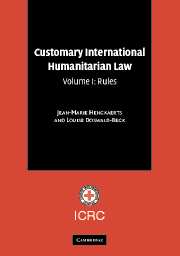Book contents
- Frontmatter
- Contents
- Foreword by ICRC President Jakob Kellenberger
- Foreword by Judge Abdul G. Koroma
- Foreword by Yves Sandoz
- Acknowledgements
- Introduction
- List of abbreviations
- Part I The Principle of Distinction
- Part II Specifically Protected Persons and Objects
- Part III Specific Methods of Warfare
- Part IV Weapons
- Part V Treatment of Civilians and Persons Hors De Combat
- Chapter 32 Fundamental Guarantees (Rules 87–105)
- Chapter 33 Combatants and Prisoner-of-War Status (Rules 106–108)
- Chapter 34 The Wounded, Sick and Shipwrecked (Rules 109–111)
- Chapter 35 The Dead (Rules 112–116)
- Chapter 36 Missing Persons (Rule 117)
- Chapter 37 Persons Deprived of Their Liberty (Rules 118–128)
- Chapter 38 Displacement and Displaced Persons (Rules 129–133)
- Chapter 39 Other Persons Afforded Specific Protection (Rules 134–138)
- Part VI Implementation
Chapter 38 - Displacement and Displaced Persons (Rules 129–133)
Published online by Cambridge University Press: 05 June 2012
- Frontmatter
- Contents
- Foreword by ICRC President Jakob Kellenberger
- Foreword by Judge Abdul G. Koroma
- Foreword by Yves Sandoz
- Acknowledgements
- Introduction
- List of abbreviations
- Part I The Principle of Distinction
- Part II Specifically Protected Persons and Objects
- Part III Specific Methods of Warfare
- Part IV Weapons
- Part V Treatment of Civilians and Persons Hors De Combat
- Chapter 32 Fundamental Guarantees (Rules 87–105)
- Chapter 33 Combatants and Prisoner-of-War Status (Rules 106–108)
- Chapter 34 The Wounded, Sick and Shipwrecked (Rules 109–111)
- Chapter 35 The Dead (Rules 112–116)
- Chapter 36 Missing Persons (Rule 117)
- Chapter 37 Persons Deprived of Their Liberty (Rules 118–128)
- Chapter 38 Displacement and Displaced Persons (Rules 129–133)
- Chapter 39 Other Persons Afforded Specific Protection (Rules 134–138)
- Part VI Implementation
Summary
Note: This chapter addresses forced displacement of civilians for reasons related to an armed conflict, whether within or outside the bounds of national territory. It thus covers the treatment of both internally displaced persons and persons who have crossed an international border (refugees). The only exception to this is Rule 130, which covers both forcible and non-forcible transfer of populations into occupied territory.
Rule 129.
A. Parties to an international armed conflict may not deport or forcibly transfer the civilian population of an occupied territory, in whole or in part, unless the security of the civilians involved or imperative military reasons so demand.
B. Parties to a non-international armed conflict may not order the displacement of the civilian population, in whole or in part, for reasons related to the conflict, unless the security of the civilians involved or imperative military reasons so demand.
Practice
Volume II, Chapter 38, Section A.
Summary
State practice establishes these rules as norms of customary international law applicable in international (A) and non-international (B) armed conflicts respectively.
International armed conflicts
The prohibition of the deportation or transfer of civilians goes back to the Lieber Code, which provides that “private citizens are no longer … carried off to distant parts”. Under the Charter of the International Military Tribunal (Nuremberg), “deportation to slave labour or for any other purpose of civilian population of or in occupied territory” constitutes a war crime. The prohibition of the transfer or deportation of civilians is set forth in the Fourth Geneva Convention.
- Type
- Chapter
- Information
- Customary International Humanitarian Law , pp. 457 - 474Publisher: Cambridge University PressPrint publication year: 2005
- 1
- Cited by

